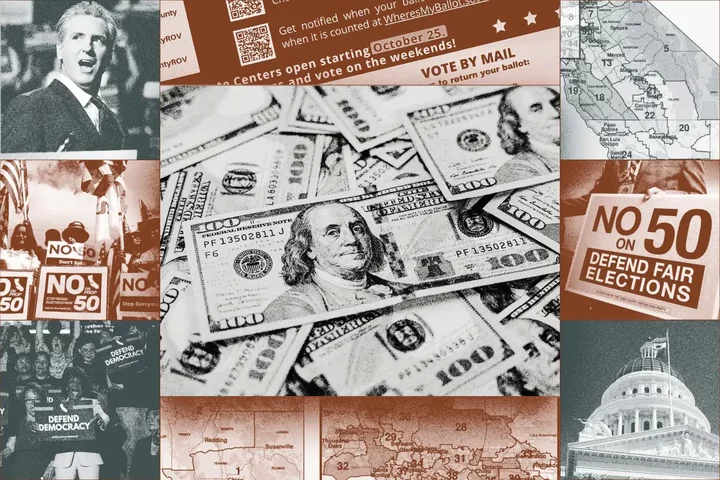Illustration by Gabriel Hongsdusit, CalMatters
###
This story was originally published by CalMatters. Sign up for their newsletters.
###
With five weeks until election day, the fight over changing congressional districts in California to favor Democrats has already become one of the most expensive ballot measures in recent state history.
The official campaigns supporting and opposing Gov. Gavin Newsom’s Proposition 50 reported raising more than $215 million as of Oct. 2, with more than $100 million raised in September alone – the third most of any proposition for at least the past decade. Campaigns only spent more money on Prop. 22 in 2020, which would have changed the employment status of Lyft and Uber drivers, and Prop. 27 in 2022, which would have legalized online gambling.
The campaign to support Prop. 50, led by Newsom, raised more than $138 million with $49 million, or about 40% of the total, coming from donors who gave less than $100. Most of those contributions were reported by the House Majority PAC. Five major donors collectively contributed a little more than $25 million. They were:
- $10 million: House Majority PAC, a SuperPAC focused on electing Democrats to Congress;
- $10 million: George Soros’ Fund for Policy Reform, which focuses on drug policy and electoral reform, according to IRS filings;
- $6.9 million: MoveOn.org, a liberal grassroots organization;
- $3 million: The California Teachers Association, a powerful union with close ties to Democrats;
- $3 million: The National Education Association, the largest teachers union in the country that gives overwhelmingly to Democrats.
Newsom also transferred $2.6 million from his 2022 gubernatorial campaign. More than 68,000 unique contributors gave money to the “Yes” campaign, according to a CalMatters analysis of data from the California Secretary of State.
The groups opposing the redistricting measure are relying on two major donors who gave more than 90% of the $77 million raised for their campaign. They have a smaller share of small donors, raising $8,300 from people who gave less than $100. Below are the top five donors:
- $42 million: The Congressional Leadership Fund, a Super PAC controlled by Republican leadership in Congress;
- $33 million: Charles Munger Jr., who contributed to the original ballot measure that created the independent redistricting commission;
- $1 million: Kevin McCarthy, former Republican Speaker of the U.S. House of Representatives, who transferred the money from his campaign account, far less the $100 million he said he would raise a few weeks ago;
- $1 million: Thomas Siebel, a Bay Area billionaire businessman who is related to First Partner of California Jennifer Siebel Newsom;
- $50,000: Republican donor Susan Groff.
Other groups unaffiliated with the campaigns are spending money, too. At least fifteen organizations spent more than $540,000 in support through ad buys and outreach, while at least seven groups spent more than $570,000 in opposition.
Newsom proposed the ballot measure after the Trump administration pressured the state of Texas to gerrymander its congressional districts in a way that would flip five Democratic seats to Republican in the upcoming 2026 midterm election.
Newsom needs voter approval because Californians created an Independent Redistricting Commission through a 2008 ballot measure. Prop. 50 would suspend the maps drawn by that independent commission until 2030.

CLICK TO MANAGE